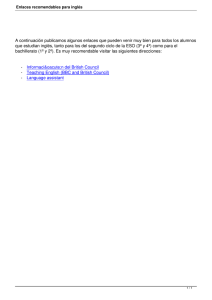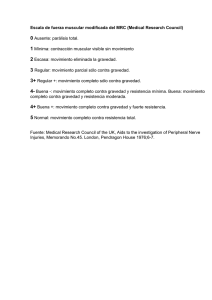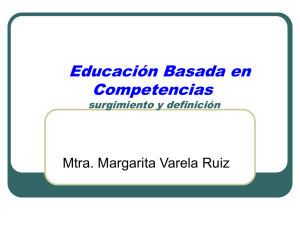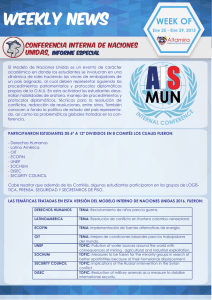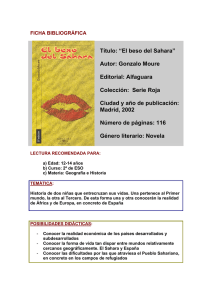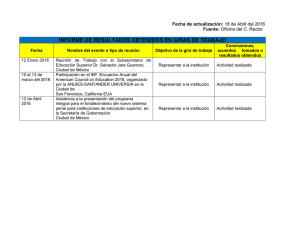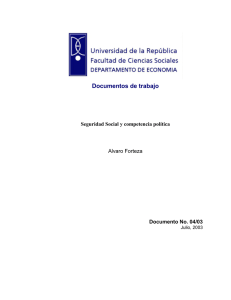Security Council Topic A: Situation in Myanmar Topic B: Situation in
Anuncio
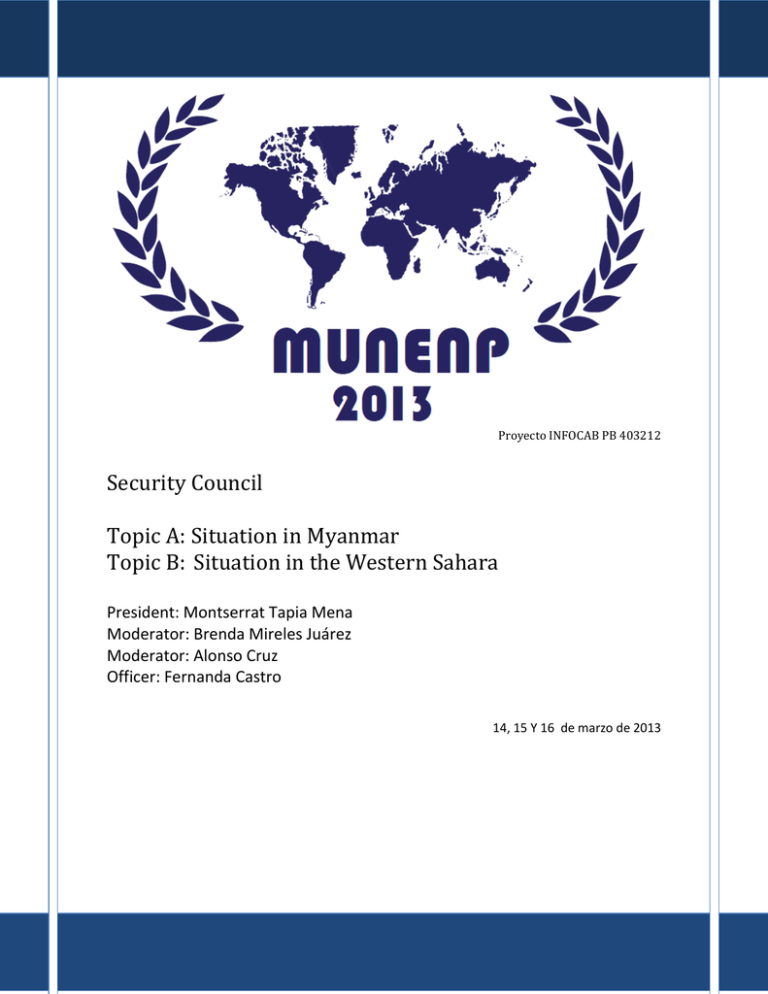
Proyecto INFOCAB PB 403212 Security Council Topic A: Situation in Myanmar Topic B: Situation in the Western Sahara President: Montserrat Tapia Mena Moderator: Brenda Mireles Juárez Moderator: Alonso Cruz Officer: Fernanda Castro 14, 15 Y 16 de marzo de 2013 "Educar para la paz es imaginar nuevas formas más solidarias y justas de sociedad; y de elaborar y ensayar hipótesis a las problemáticas mundiales.” José Tuvilla Rayo Estudiantes, Académicos y Observadores: De parte de todos los que trabajamos en este proyecto pedagógico, con la firme intención de educar para la paz, les damos la más cordial bienvenida al 2° Foro Interamericano y 4° Modelo de Naciones Unidas de la Escuela Nacional Preparatoria. Dice el Dr. José Narro Robles, rector de la Universidad Nacional Autónoma de México, en su Plan de Trabajo 2011-2015 Por fortuna la comunidad universitaria no vive sólo de su pasado relevante. Por el contrario, su compromiso es con el futuro. Nuestro mayor interés tiene que ver con los jóvenes y con los niños, con los que ahora estudian e incluso con las generaciones que todavía no nacen. Muchos de nosotros compartimos la preocupación por lo que les vamos a dejar para hacer frente al futuro, a los próximos desafíos. Darles a los jóvenes la oportunidad de participar en un foro y en un ejercicio de simulación, que les permita discutir y profundizar, no solo sus relaciones interpersonales o sus conocimientos, sino profundizar en la toma de conciencia, de la empatía, de la resolución de problemas, en cooperación con un punto común: La cultura de la Paz. Siguiendo esencialmente esta idea de nuestro rector, y las líneas rectoras correspondientes al Plan de Desarrollo de la Universidad 2011-2015, Línea Rectora N° 1 “Mejorar la calidad y pertinencia de los programas de formación de los alumnos de la UNAM e incrementar la equidad en el acceso a aquellos métodos, tecnologías y elementos que favorezcan su preparación y desempeño“ y la línea N° 9 “Incrementar la proyección internacional de la UNAM mediante el aumento sustancial en el número de intercambios de académicos y alumnos, al igual que a través del establecimiento de redes y programas de colaboración”, es como sigue concibiéndose y desarrollándose este proyecto. No queda más que desear que su estancia y su aprendizaje, sea lo más gratificante posible, reiterándoles siempre nuestro compromiso de AMOR, ORDEN y PROGRESO. “Por mi raza hablará el espíritu” ATENTAMENTE Comité Organizador MUNENP 2013 “Valor es lo que se necesita para levantarse y hablar, pero también es lo que se requiere para sentarse y escuchar.” Winston Churchill Estimados delegados, ministros y jueces, Es un placer para mí, poder darles la bienvenida a la cuarta edición del Modelo de Naciones Unidas de la Escuela Nacional Preparatoria. MUNENP se ha convertido en uno de los eventos académicos más esperados para la comunidad preparatoriana interesada en debatir y encontrar soluciones a problemas que afectan a la comunidad internacional, debido a que MUNENP les ofrece un espacio para verter opiniones y propuestas que estén llenas del espíritu joven, innovador y valiente que caracteriza a nuestra comunidad. En pasadas ediciones he participado como delegado, mesa y esta vez en un honor ser el Secretario General de tan noble evento, por ello es que MUNENP representa para mí el crecimiento y la evolución que puede tener un alumno, como muchos, de la Escuela Nacional Preparatoria con dedicación, esfuerzo y trabajo. Por eso los invito a que durante los tres días de debate en sus respectivos comités sean estas acciones las que predominen y sean el camino para lograr exitosas resoluciones a problemas que por intereses lejanos a lo humano no han podido terminar. Para la realización de este festejo a la libertad de expresión y a la creación de soluciones, hemos tenido el apoyo de funcionarios importantes de nuestra alma máter, así mismo académicos y alumnos de nuestra Universidad han trabajado por muchos meses para la realización de MUNENP. Así que quiero dar un reconocimiento a todos ellos que nos han regalado su tiempo y trabajo para que juntos cumplamos el sueño de ser mejores personas, más consientes, más inteligente y sobre todo más sensibles a nuestros semejantes después de tres días de profundizar en hallar una mejor respuesta a aquellas preguntas que muchos, por falta de conocimiento o de valor, no se atreven a contestar. Este año en MUNENP hemos decidido plantear temas controversiales y que estimularán la sensibilidad política y habilidades de negociación de nuestros delegados. Además, con el objetivo de que los delegados desarrollen al máximo su oratoria, redacción y habilidades de liderazgo es que decidimos que los tópicos fueran de gran interés para la juventud y además fueran altamente competitivos para el nivel educativo que cursamos. Finalmente lo único que me resta es desearles que disfruten de MUNENP 2013. Siéntanse orgullosos de ustedes mismos por haber tomado la iniciativa de participar en un foro para dar todo de ustedes, su conocimiento, su interés, sus ideas y sobre todo su corazón. Atentamente Rodrigo Arturo Salazar Chávez Secretario General de MUNENP 2013 "There is an extremely subtle and dangerous temptation to confuse peace with the mere absence of war, and be tempted to confuse health with the absence of disease, or the freedom to not be imprisoned. Terminology is sometimes misleading, for example, the term "peaceful coexistence" means no war and no true peace." Dominique Pire Delegates: Today, we have the honor and privilege to welcome you to the fourth edition of the Model United Nations of the Escuela Nacional Preparatoria. In first place, allow us to congratulated you because of your interest and participation in the Security Council. The approach to the actual international conflicts had taken a vital importance for the understanding of our social environment that surround us. But, having the conviction and capacity to make a change, characteristics that everyone involved in a model may have, have took more relevance, cause with them we will achieve that every word, idea but first of all solutions that will be stablished have a social impact in the structures that compete. However you might have in mind, that the problematics that will be discuss, can not concordance with your opinions and the ones of the country you are representing, there is the crucial point and where the exaltation of each one of your qualities come to the light, with a fidelity representation of the interest of the nation involved in the debate but without letting away your ideals and values that have characterized your moral development. Even the development of the debate depends principally on you, we, like your Chair, will be in all the disposition for giving you all the help necessary on the process for the obtaining of the better resolutions and comply with the finality that gather us in this council, achieving the best comprehension, by each integrant, of the situations that in other regions are lived and in a moment if it exist the possibility of a change in favor of the common welfare, taking in account the habitants of the affected regions by the presented problematic but also the nations in way of searching international peace and security, been participates of them. At last, delegates,enjoy this model,that has been prepare for your academic and personal development, but also to be enjoy and pass nice time in company of people, that you might know or will have the possibility to meet. Delegates, enjoy MUNENP 2013 Success and congratulations. Attentively Presidium of the Security Council PRESIDENTE HONORARIO Dr. José Narro Robles Rector Universidad Nacional Autónoma de México MIEMBROS HONORARIOS M.C. Miguel Robles Bárcena Secretario de Servicios a la Comunidad Dr. Dante Jaime Morán Zenteno Dirección General de Asuntos del Personal Académico Dr. Ramiro de Jesús Sandoval Dirección General de Incorporación y Revalidación de Estudios. Mtra. Silvia Estela Jurado Cuellar Directora General Escuela Nacional Preparatoria Dra. Virginia Hernández Ricárdez Directora Escuela Nacional Preparatoria Plantel 1 “Gabino Barreda” Lic. Antonio Meza Director Escuela Nacional Preparatoria Plantel 2 “Erasmo Castellanos Quinto” Lic. Ligia Kamss Paniagua Directora Escuela Nacional Preparatoria Plantel 3 “Justo Sierra” Lic. Agustín Sánchez Orendáin Director Escuela Nacional Preparatoria Plantel 4 “Vidal Castañeda y Najera” Biol. Ma. Dolores Valle Martínez Directora Escuela Nacional Preparatoria Plantel 5 “José Vasconcelos” Mtra. Alma Angélica Martínez Pérez Directora Escuela Nacional Preparatoria Plantel 6 “Antonio Caso” Lic. Leopoldo Martínez González Director Escuela Nacional Preparatoria Plantel 7 “Ezequiel A. Chávez” Ing. Raymundo Velázquez Martínez Director Escuela Nacional Preparatoria Plantel 8 “Miguel E. Schulz” Mtra. María de los Ángeles Lara Arzate Directora Escuela Nacional Preparatoria Plantel 9 “Pedro de Alba” CONSEJO EJECUTIVO Mtra. Arcelia Moreno Agraz Coordinadora General Modelo Internacional de Naciones Unidas de la Escuela Nacional Preparatoria Lic. Enmanuel Santana Coordinador Taller, Educar para la Paz, desde el ejercicio de simulación de la Organización de las Naciones Unidas Coordinación Académica Mtra. Arcelia Moreno Agraz MBA. Luis Parra Pantoja Mtra. Mayra Santos Medina Biol. Esther de la Paz Pérez Farca QFB. Adriana María Treviño Valdés Lic. Rosario Benítez García Mtra. Rosa Pacheco García Lic. María de los Ángeles Castañeda González Dra. Gabriela Moreno Agraz Lic. Araceli Mejía Barrón MESAS Consejo de Derechos Humanos Presidenta: Rosalba García Martínez Moderadora: Valeria Pioquinto Morales Oficial de Conferencias: Arturo Jasso ORGANIZACIÓN DE LAS NACIONES UNIDAS PARA LA CIENCIA, LA CULTURA Y LA TECNOLOGIA, UNESCO Presidente: Oscar Genaro Macías Betancourt Moderador: Juan José Rivera Avendaño Moderador: Luis Alberto Llamas Moderadora: Patricia García Oficial de Conferencias: Ricardo Trujano Comisión de la Condición Social y Jurídica de la Mujer Presidente: Riquerny Luis Mota Mena Moderadora: Niyima Elizalde Guzmán Moderadora: Diana González Galván Oficial de Conferencias: Oscar Repizo San Emeterio Consejo Europeo de Ministros Presidenta: Patricia Angélica Quiles Moderadora: Isabel Torres Ramírez Moderadora: Paola Elizabeth Villanueva Jurado Oficial de Conferencias: Arturo del Río Treviño Security Council President: Montserrat Tapia Mena Moderator: Brenda Mireles Juárez Moderator: Alonso Cruz Confference Officer: Fernanda Castro International Court Of Justice President: Karen Lizbeth Pérez del Valle Vice-president: Samantha Bautista Paredón Registrar: Balam Garcés Esparza COMITÉ DE CRISIS Elba Gutiérrez Castillo Edgar Moreno Villanueva Israel Salazar Rosas América Zepeda Cabiedes COMITÉ DE EVALUACION (JURADO EVALUADOR) Mtra. Arcelia Moreno Agraz MBA. Luis Parra Pantoja Biol. Esther de la Paz Pérez Farca QFB. Adriana María Treviño Valdés Lic. Rosario Benítez García Mtra. Rosa Pacheco García Lic. María de los Ángeles Castañeda González Mtra. Mayra Santos Dra. Gabriela Moreno Agraz Lic. Araceli Mejía Barrón COORDINACION LOGISTICA Abraham Alejandro Gutiérrez Vázquez Apoyo al delegado y delegado internacional María del Rosario Navarrete Valeriano Maetzin Rodea González Coordinación de Pajes QFB. Adriana María Treviño Valdés Lic. Rosario Benítez García SECRETARIA GENERAL MUNENP2013 Rodrigo Arturo Salazar Chávez Carlos Augusto Hernández García Mesa Revisora Alfredo Maldonado García APOYO ACADÉMICO Víctor Manuel Miranda Leyva Samantha Monroy Mondragón Luis Adolfo Cid Rojas Cristian Yael Torres Frausto JUEVES 14 DE MARZO 10:00-12:00 REGISTRO DELEGADOS 13:00-14:00 CEREMONIA INAUGURACIÓN 14:00-15:45 COMIDA 16:00-17:00 1ª Sesión 17:00-17:15 Receso 17:15 - 19:00 2ª Sesión VIERNES 15 DE MARZO 9:00 – 10:15 3º Sesión 10:15 - 10:30 Receso 10:30 – 12:00 4º Sesión 12:00 – 12:15 Receso 12:15 – 13:45 5º Sesión 13:45 – 15:30 Comida 15:30 – 17:00 6º Sesión 17:00 – 17:15 Receso 17:15 – 18:30 7º Sesión SÁBADO 16 DE MARZO 9:00 – 10:30 8º Sesión 10:30 – 11:00 Receso 11:00 – 13:00 9º Sesión LUNCH 13:30-15:00 SESIÓN PLENARIA 15:15-16:00 CLAUSURA MUNENP 2013 AUDITORIO Security Council Under the Charter, the Security Council has primary responsibility for the maintenance of international peace and security. It has 15 Members, and each Member has one vote. Under the Charter, all Member States are obligated to comply with Council decisions. When a complaint concerning a threat to peace is brought before it, the Council’s first action is usually to recommend that the parties try to reach agreement by peaceful means. The Council may: set forth principles for such an agreement; undertake investigation and mediation, in some cases; dispatch a mission; appoint special envoys; or request the Secretary-General to use his good offices to achieve a pacific settlement of the dispute. When a dispute leads to hostilities, the Council’s primary concern is to bring them to an end as soon as possible. In that case, the Council may: issue ceasefire directives that can help prevent an escalation of the conflict; dispatch military observers or a peacekeeping force to help reduce tensions, separate opposing forces and establish a calm in which peaceful settlements may be sought. Beyond this, the Council may opt for enforcement measures, including: economic sanctions, arms embargoes, financial penalties and restrictions, and travel bans; severance of diplomatic relations; blockade; or even collective military action. A chief concern is to focus action on those responsible for the policies or practices condemned by the international community, while minimizing the impact of the measures taken on other parts of the population and economy.1 1 United Nations Security Council, What is the Security Council, http://www.un.org/en/sc/about/ Topic A: Situation in Myanmar Introduction Between two enormous and important ancient civilizations, China and India, is located a country that has suffered the problems of the war and political interests. Myanmar, also called Burma has been through many manifestations and internal wars. Since the 60s decade, the country saw the authoritarian power of the government, and the habitants have been under the military force. So many political prisoners, internal conflicts, nondemocratically elections, attacks to the religion, students wanting revolution and also the natural devastation, represented big problems for the society from Myanmar. Myanmar, a country under the international pressure, needs preoccupation and commitment with its society to protect liberties and rights for the habitants. The Security Council has the obligation of ensure the security of all the people in the country. Although the announcement of the redaction of a new Constitution by the Military Council in Myanmar as part of new democracy is important to realize that the country does not just have political problems, Myanmar has also an economic and health worrying situation. The little and incorrect use of the raw material, the low industrial inversion, AIDS causing the death of 20, 000 habitants per year, or corruption are the principal problems in a country where maybe takes the last place about protection and application of human rights. Antecedents Various ethnic Burmese and ethnic minority city-states or kingdoms occupied the present birders through the 19th century. During the period of 1824 to 1886, Britain conquered Burma and incorporated the country into its Indian Empire. Burma was administered as a province of India until 1937 when it became a separate, self-governing colony; in 1948, Burma attained independence from the Commonwealth. Ne Win dominated the government from 1962 to 1988, first as a military ruler, then as self-appointed president, and later as political kingpin. In September 1988, the military deposed Ne Win and established a new ruling junta. Multiparty legislative elections in 1990 resulted in the main opposition party -the National League for Democracy- winning a landslide victory. Instead of handing over power, the junta placed NLD leader Aung San Suu Kyi, who was under home arrest from1989 to 1995, 2000 to 2002 and from May 2003 to November 2010. In late September 2007, the ruling junta brutally suppressed protests over increased fuel prices led by prodemocracy activists and Buddhist monks, killing at least 13 people and arresting thousands for participating in the demonstrations. In early May 2008, Burma was struck by Cyclone Nargis, which left over 138,000 dead and tens of thousands injured and homeless. Despite this tragedy, the junta proceeded with its May constitutional referendum, the first vote in Burma since 1990. Parliamentary elections held in November 2010, considered flawed by many in the international community, saw the ruling Union Solidarity and Development Party garnering over 75% of the seats. Parliament convened in January 2011 and selected former Prime Minister Thein Sein as president. Although the vast majority of national-level appointees named by Thein Sein are former or current military officers, the government has initiated a series of political and economic reforms leading to a substantial opening of the long-isolated country.2 Development Elections of 1990 in Myanmar At the end of May 1990, the SLORC (State Law and Order Restoration Council) organized elections in which the opposition could participate with the unusual claim to gain the people's trust by a blow of authority and win the election, which denotes a complete lack 2 Central Intelligence Agency, The World Factbook, East & South East Asia: Burma, https://www.cia.gov/library/publications/the-world-factbook/geos/bm.html. in of connection with reality of the Burmese people. But to the surprise of the military council, these resulted in an absolute majority of the opposition: National League for Democracy (LND). The Restoration Council of the State Law and Order decide to ignore the results and prohibited the elected Popular Assembly to meet, announced its continuity in the powe and arrested the members of the winner party, principally its president Aung San Suu Kyi, daughter of U Aung San. A year later she received the Nobel Peace Award, as a rejecting reaction from the international community to those act against the sovereignty of the country. Western diplomats, human rights activists and journalists made the logical assumption that the elections would be neither free nor fair, given the continued imprisonment of opposition leaders like Aung San Suu Kyi, who now headed a unified opposition, the National League for Democracy (NLD). Campaigning was essentially nonexistent, there was no free media. “In a free election, the National League for Democracy would win. Even under severe restrictions, it would do well if the votes are counted fairly,” said one diplomat at the time. In march 1998 the students, one of the social groups more repressed and looked for, because of the use of the right to liberty of expression, by the regimen, went out to the streets to ask for a democratic regimen. The repression was brutal. Lots of students died in Rangun. But the protests did not lowed until U Ne Win renounced, after 36 years in the power. After the disturbs of 1998, the detentions of politic character, the lack of free expression, the brutal repression and the violation to human rights, had increased. New elections in 2010 and members of the military council created a new Party, “The party for the Union, Solidarity and Development”. It apparently won but the elections were not transparent once again. The Burma´s government is neutral, talking about international conflicts and its relations with other countries are principally commercial. The Nargis Cyclone: An Humanitarian tragedy The problems got worse with the Nargis Cyclone in 2008, it devastated the city and caused the death of more than 140, 000 habitants. Other 800,000 habitants were displaced. It was the worst humanitarian crisis the asian southeast had seen. The government did not care at first moment and was not able to solve the problem, forbidding the entrance of help to the country from the international community. A referendum about the democratic future of the state. The government created a referendum to approve a new constitution, which gave more power to the military council, invalidating the results from elections in 1990 and prohibiting political prisoner to aspire to parliamentary candidatures. The referendum was approved under suspects of little transparency and of not being under democratic. Dispute between Muslims and Buddhists in Myanmar The dispute between the Muslim population and the Buddhist, are common in Rohingya. The crisis started decades ago. Although 800,000 Muslims from the Rohingya ethnic group habit in Burma, the authorities from this country (most of it Buddhist) does not recognize the citizenship to them. Most of them, considerate them like foreigners from Bangladesh coming for their land. The Muslin community is neither recognized by Bangladesh, where a 300,000 rohinya live in refugees campsites. The dispute and violence started on May 28th, where a body of a Buddhist woman was found, supposedly she was raped and assassinated by a group of Muslims. On June 2nd, Buddhists stopped a car where the guilty group of Muslims was traveling. They killed ten Muslims, since then Islamic groups have fired mesquites and Buddhists temples and made chaos in 14 localities of the State. It is estimated, 112 dead people and approximately 2,000 buildings destroyed. More than 70 persons resulted injured in these disturbs, where we can count children. On November 24th the United Nations emitted a resolution expressing its preoccupation for the disputes between these two religious groups. The resolution was approved by the 193 members of the General Assembly, asking Myanmar government to take measures to solve the situation in Rohingya and protect Muslim´s human rights, including the right to get citizenship. The Rohingyas are vulnerable to acts of violence, persecution, expulsion and displacement. Guide questions What related points with the conflict, do the Burmese State and the Security Council, should considered for a rapidly solution? In which form, the Security Council's intervention would help for the resolution of the conflict? What would be the best way in which Security Council's State Members can promote a solution for the attacks presented in the Burmese territory? References http://www.iecah.org/web/index.php?option=com_content&view=article&id=2067%3Am yanmarbirmania-analisis-de-un-conflicto&catid=35%3Acrisis-invisibles&Itemid=87. http://www.securitycouncilreport.org/monthly-forecast/200711/lookup_c_glKWLeMTIsG_b_3531157.php http://www.securitycouncilreport.org/atf/cf/%7B65BFCF9B-6D27-4E9C-8CD3CF6E4FF96FF9%7D/Myan%20S2007%2014.pdf http://www.whatsinblue.org/2012/04/briefing-on-myanmar.php http://www.whatsinblue.org/2012/06/myanmar-consultations.php# http://www.periodistas.org/redseguridad/Myanmar.pdf http://www.periodistas.org/redseguridad/Myanmar.pdf http://www.iecah.org/web/index.php?option=com_content&view=article&id=2067:myan marbirmania-analisis-de-un-conflicto&catid=35:crisis-invisibles&Itemid=87 http://www.diplomatshandbook.org/pdf/Handbook_Burma.pdf http://www.madrimasd.org/blogs/universo/2008/05/07/91191 http://birmania-libre.blogspot.mx/2011/04/myanmar-por-tomas-vera-ziccardi.html http://www.madrimasd.org/blogs/universo/2008/05/07/91191 http://dossiergf.wordpress.com/2012/10/29/birmania-mas-de-cien-muertos-porchoques-entre-musulmanes-y-budistas/ http://internacional.elpais.com/internacional/2012/06/11/actualidad/1339424232_09062 8.html http://spanish.irib.ir/radioislam/noticias/item/80975-onu-emite-una-resoluci%C3%B3nsobre-enfretamientos-budistas-musulmanes-en-myanmar Central Intelligence Agency, The World Factbook, East & South East Asia: Burma, in https://www.cia.gov/library/publications/the-world-factbook/geos/bm.html. Topic B: Situation in Western Sahara Introduction A conflict with duration of approximately 40 years has left two nations with a stopped development. The war; which has leave deaths, refugees, hunger and displaced people, concerned the interest of the Security Council. Actually, both parties are still unable to get an agreement, situation that causes more misery for the people in the conflict. Is obligation of the Security Council to achieve a just, lasting and mutually acceptable solution. The lack of progress produces suffering to the people of Western Sahara, representing instability in the region and obstructs the economic and social development of the region. Antecedents The Western Sahara, or former Spanish Sahara, is an expanse of desert measuring over 260,000 square kilometers, bordered by Morocco, Algeria and Mauritania. The territory, which traditionally had a tribal, nomadic population, was under Spanish occupation from 1904 until 1975. Following the Second World War, the rise of nationalist sentiment had a destabilizing effect on the European colonial powers. The United Nations eventually responded to the growing demands for self-determination by adopting a resolution on decolonization in 1960. In 1966, the United Nations called on Spain to make arrangements for a U.N. sponsored referendum, enabling the population of the territory to exercise its right to self-determination. However, Spain did not take any action towards organization of a referendum and, on May 10, 1973, the Popular Front for the Liberation of Saguia el Hamra and Rio de Oro, known as the Polisario Front, was formed to fight for Sahrawi independence from Spain. After two years of guerrilla warfare, Spain agreed to undertake a U.N. - sponsored referendum, scheduled to be held in the territory in 1975. In preparation for the process, Spain conducted a census in 1974 of the population present in the territory.3 Development The Wall of Shame and the political situation. In 1975, Morocco took over Western Sahara. King Hassan II of Morocco sent a group of 350, 000 civilians to occupy, in an illegally way, the territory, while soldiers invaded the north zone fighting against POLISARIO Front using napalm bombs against the helpless saharahuis. The POLISARIO Front, representing Western Sahara´s nationalism fought against Morocco, and helped by its regional adversary Algeria; declared the independence from the Arabian Saharahui Democratic Republic. Morocco built a wall of more than 2,700 kilometers armed with terrestrial mines and armed soldiers. This divided the territory, approximately the 85% of land was occupied by Morocco and the other part, the Free Sahara governed by POLISARIO Front. The war between the Moroccan Army and POLISARIO Front, prolonged until 1991, when both parties agreed a ceasefire designed by the United Nations that specified the celebration of a referendum, so the saharauis could accept or not an independent nation or be part of Morocco. Here start the actions of negotiation sponsored by the Security Council and the important Secretary General´s Envoy Baker. The United Nations Mission for the Referendum in Western Sahara (MINURSO) was established by Security Council resolution 690 of April 29, 1991 in accordance with settlement proposals accepted on August 30, 1988 by Morocco and POLISARIO Front. The settlement plan, was approved by the Security Council, provided for a transitional 3 Human Rights Watch, Keeping in Secret: the United Nations Operation in the Western Sahara, in http://www.hrw.org/reports/1995/10/01/keeping-it-secret. period for the preparation of a referendum in which the people of Western Sahara would choose between independence and integration with Morocco. The Special Representative of the Secretary-General was to have sole and exclusive responsibility over matters relating to the referendum and was to be assisted in his tasks by an integrated group of civilian, military and civilian police personnel, to be known as the United Nations Mission for the Referendum in Western Sahara. In Resolutions of the Security Council 1359 in 2001 and 1394 in 2002 the committee asks for cooperation for the negotiations between the countries, and extends MINURSO again and again. By 2012 the situation in the Western Sahara stood peaceful over the last year, even though there are no advances reported in the negotiation of the future statement in this territory. Problems manifested are related to movement liberty and free access to the interlocutors moderating the negotiations. The actual special Envoy, Christopher Ross, manifested that the last three negotiations celebrated in 2011, demonstrated the interest of the parties to continue discussing about topics of mutual interest. Human Rights In the last 15 years have improved human rights in Morocco. The government has allowed more freedom of expression and an independent look-out of the human rights ; and it has established a council of true that investigates and recognizes all the past abuses and victims which are compensated. Some of the worst practices common in the past had been ended, like "disappearances" for long periods. However, the way that the authorities’ repress the opposition to the official positions about Sahara is part of Morocco demonstrates boundaries of the progress in the human rights. The government does not allow pacific manifestations and denies the legal establishment of Human Rights Organizations. The security forces arrests manifestants and saharahuis activists, being tortured, harmed and obligated to signs “confessions”; the tribunals send them to prison with unfair processes. Guide questions Which had been the causality of the little response to the diverse resolutions planted for the conflict? What consequences in the political and economic way but also in the regional and international ambit, do the successes in Western Sahara had left? Which points should be considered with more relevance for the establishment of agreements between the interested parts, to thereby generate a speedy pacification within the territory? References http://www.crisisgroup.org/en/regions/middle-east-north-africa/north-africa/westernsahara/065-western-sahara-the-cost-of-the-conflict.aspx?alt_lang=es http://www.fpif.org/articles/unlocking_the_conflict_in_western_sahara https://www.cia.gov/library/publications/the-world-factbook/geos/wi.html http://www.frentepolisario.com/ R 1394 http://daccessddsny.un.org/doc/UNDOC/GEN/N02/265/71/PDF/N0226571.pdf?OpenElement R 1429 http://daccess-ddsny.un.org/doc/UNDOC/GEN/N02/502/44/PDF/N0250244.pdf?OpenElement http://www.un.org/en/peacekeeping/missions/minurso/ http://www.un.org/ga/search/view_doc.asp?symbol=S/RES/690(1991) http://www.un.org/en/peacekeeping/missions/minurso/background.shtml http://www.un.org/ga/search/view_doc.asp?symbol=S/RES/690(1991) http://www.frentepolisario.com/index.php http://www.hrw.org/node/77259/section/2 Human Rights Watch, Keeping in Secret: the United Nations Operation in the Western Sahara, in http://www.hrw.org/reports/1995/10/01/keeping-it-secret. BBC News Africa, Western Sahara Profile, in http://www.bbc.co.uk/news/world-africa- 14115273.
